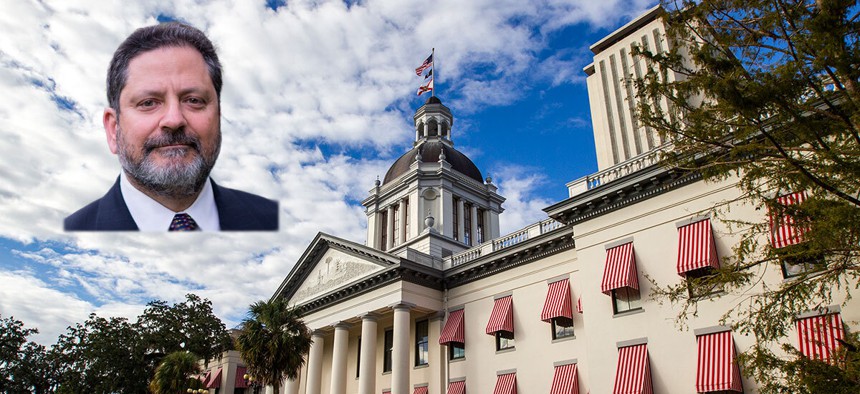Personality
Five Questions for Dominic Calabro
The Florida TaxWatch president & CEO talks about taxes, ‘turkeys’ and more.

Photo illustration by Anabel Dayao/City & State. Photos by Florida TaxWatch; Mark Wallheiser/Getty Images
As we wait to see what Gov. Ron DeSantis has done to the 2023-24 state budget with his red pen, the watchdog of Florida’s public money has already offered its two cents.
Florida TaxWatch recently released its 2023 Budget Turkey Watch Report, which identifies budget items the group believes circumvent transparency and accountability standards in public budgeting. Analysts identified 218 appropriations worth $598.7 million that they labeled as budget ‘turkeys,’ while also highlighting an additional $1.2 billion they recommend DeSantis scrutinize.
City & State spoke with Florida TaxWatch President & CEO Dominic Calabro about the work that went into the report, TaxWatch’s almost 40-year history producing it each year and improvements he wants to see in Florida’s budgeting process.
With that, here’s five questions for Calabro. The questions and answers have been edited for clarity and brevity:
How much work goes into scouring the budget every year to find the turkeys?
It's a very intense undertaking. Fortunately, the staff have several decades of experience doing it. Kurt Wenner, our senior vice president of research, is our primary lead analyst on it. But we also have another senior vice president and entire research staff that helps review every single line of the budget. … It takes hundreds of hours.
We have a much leaner staff than the governor's office and the House and Senate committees, who have hundreds of staff. However, we also do collaborate with the government, because it’s not an anti-legislative or anti-government undertaking. It's designed at its base to identify that tax dollars, which represent the hard earned fruits and labor of the working families and taxpayers of Florida, first and foremost are allocated above-board and responsibly.
On average, how often do governors follow your recommendations to trim turkeys out of the budget and what was your best year?
(Laughs) That’s like asking me, ‘who’s your favorite child?’
For the nearly 40 years we’ve done this, there have been about three or four cases where the governor at the time vetoed nearly all of the turkeys that we've identified, but the normal range is around 70% to 75%, under both Republican and Democratic governors.
It began to be taken seriously under Gov. Martinez, then continued to grow under Lawton Chiles. It was fully embraced under Gov. Jeb Bush. He would say to legislators, ‘If it is on the TaxWatch turkey list, it's dead on arrival.’
It is something that has been embraced by Republicans and Democrats because it helps provide a check to ensure that the proper process and vetting is followed. It's really designed to ensure there's accountability.
How many of the turkeys do you expect Gov. DeSantis to veto this year?
We’ve changed what we ask for with the list. Previously we recommended that a governor veto, but we're not doing that now. Instead, we're asking the governor to take a serious review, in part because of how the processes evolved of late.
It's a false goal to figure out what DeSantis will do. He respects our independence, so we don't try to coordinate or collaborate with him when it comes to his decision-making. But we have a good working relationship with DeSantis.
His budget director (Chris Spencer) came and spoke at our spring board meeting. We've worked closely with the governor’s budget office for five years now. Gov. DeSantis has had a very high percentage of what he has reviewed and vetoed in the past, and he’s also far exceeded our list of items that we didn't call turkeys that he struck from the budget before for different policy decisions.
What are some ways you think Florida’s budgeting system could improve?
I think they need to get the Legislature and the public involved earlier in the actual development of the budget. They did a great job of putting a budget together really fast (this year). Senate President (Kathleen) Passidomo and Speaker (Paul) Renner deserve a lot of credit.
But then they send these lists of additional projects, coined by those in the process the ‘sprinkle list,’ six or seven pages of hundreds of projects. What bang for their buck are taxpayers going to get from the additional investment from those lists? There needs to be more effort to identify what value to the taxpayer will be added if those projects are funded.
One change should be the implementation of more five-year planning processes for different project types, like the one currently in place for historic restoration projects. Those allow for uniformity and fairness to be applied to all projects, with the ones that are the most dire and would have the most impact being prioritized in a fully transparent process. Such processes could be implemented for water infrastructure-related projects, for example.
Does the amount of turkeys your group finds concern you about the budgeting process in the Legislature?
We say again and again at Florida TaxWatch that the state of Florida is a beacon of fiscal stewardship, and that other states should emulate us. New York's budget is over twice the size of Florida's state budget, and their population is a little bit smaller.
Bottom line: Florida is doing a fantastic job, even with this review. It is doing well partly because we bring attention to how you can do it better. That's how you keep (a) high quality – by being intellectually honest, by challenging the system, not by accepting the status quo and letting it grow unchecked.
We've developed over 40 years a really thoughtful checks-and-balances system that is helpful for ensuring the great work that our state is doing. We’re really proud of (both) the Florida Legislature (and) our governor for keeping the fiscal burden down.
Contact Tristan Wood at twood@cityandstatefl.com and follow him on Twitter: @TristanDWood
NEXT STORY: Broward environmental activist Cat Uden is trying to beat the odds on controversial beach project
